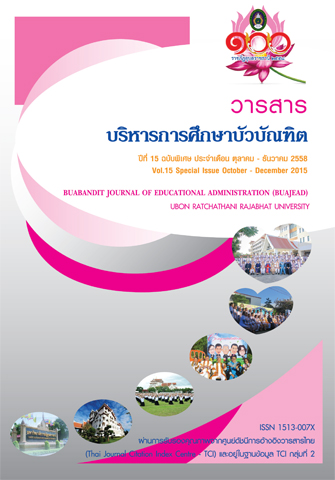รูปแบบการพัฒนาบุคลากรเพื่อความจงรักภักดีต่อองค์กรของสถานศึกษา ระดับประถมศึกษา
Main Article Content
บทคัดย่อ
การวิจัยครั้งนี้มีวัตถุประสงค์เพื่อสร้างรูปแบบการพัฒนาบุคลากรเพื่อความจงรักภักดีต่อองค์กร ของสถานศึกษาระดับประถมศึกษา โดยใช้ระเบียบวิธีการวิจัยและพัฒนา กลุ่มตัวอย่างมี 2 กลุ่ม กลุ่มที่ 1 เป็นครูผู้สอนในสถานศึกษา สังกัดสำนักงานเขตพื้นที่การศึกษาประถมศึกษานครศรีธรรมราช เขต 2 จำนวน 310 คน ได้มาจากการสุ่มอย่างง่าย เก็บข้อมูลด้วยแบบสอบถาม กลุ่มที่ 2 เลือกแบบเจาะจงจากกลุ่มตัวอย่าง ในกลุ่มที่ 1 ที่ได้รับการแปลผลจากเครื่องมือฉบับที่ 1 ทั้งฉบับอยู่ในระดับมากที่สุด จำนวน 27 คน และผู้บริหาร สถานศึกษาของกลุ่มตัวอย่างกลุ่มที่ 1 ที่ได้รับการเลือก จำนวน 27 คน รวม 54 คน เก็บข้อมูลโดยการสัมภาษณ์ แบบย้อนรอยประสบการณ์ ปรับปรุงรูปแบบโดยการสนทนากลุ่มผู้เชี่ยวชาญ 15 คน และประเมินรูปแบบ โดยผู้เชี่ยวชาญ 15 คน ซึ่งมีคุณสมบัติคือ เป็นผู้บริหารระดับสูงหรือเป็นนักวิชาการที่เชี่ยวชาญหรือเป็นผู้ปฏิบัติ ที่ประสบความสำเร็จในการพัฒนาบุคลากร วิเคราะห์ข้อมูลด้วยการหาค่าความถี่ ค่าร้อยละ ค่าเฉลี่ย ส่วนเบี่ยงเบน มาตรฐาน และการวิเคราะห์เนื้อหา
ผลการวิจัยพบว่า
รูปแบบการพัฒนาบุคลากรเพื่อความจงรักภักดีต่อองค์กรของสถานศึกษาระดับ ประถมศึกษา ประกอบด้วย เป้าหมายตามกรอบแนวคิดความจงรักภักดีต่อองค์กร 5 องค์ประกอบ คือ 1) ด้าน ความผูกพันกับองค์กร 2) ด้านการยอมรับต่อเป้าหมายองค์กร 3) ด้านการปกป้ององค์กร 4) ด้านการประชาสัมพันธ์ องค์กร 5) ด้านความร่วมมือสนับสนุนองค์กร โดยมีหลักการพื้นฐานในการพัฒนาบุคลากรตามยุทธศาสตร์คือ 1) บทบาทหน้าที่ 2) ความรู้ 3) อำนาจร่วม และประกอบด้วยยุทธศาสตร์การพัฒนาบุคลากร 3 ยุทธศาสตร์ โดยแบ่งตามองค์ประกอบการพัฒนาบุคลากร ดังนี้ 1) ด้านบริบทประกอบด้วยยุทธศาสตร์การดำเนินงาน แบบมีส่วนร่วม 2) ด้านสมรรถนะประกอบด้วยยุทธศาสตร์การพัฒนาสมรรถนะ และ 3) ด้านการสร้างแรงจูงใจ ประกอบด้วยยุทธศาสตร์ด้านสวัสดิการและประโยชน์เกื้อกูล
The Personnel Development Model for Organizational Loyalty in Primary Schools
The purposes of this research were to create the personnel development model for organizational loyalty in primary schools. The research methodology was Research and Development (R&D) style. There were two groups of samples. The primary stage of sampling groups consisted of 310 teachers in schools under Nakhon Si Thammarat Primary Educational Service Area Office 2. The secondary stage was 27 teachers and 27 school administrators, which were purposively selected from the sampling group. The data were collected by reverse experience interviews. The model was improved by focus group discussion with 15 experts and evaluated by 15 experts who were qualified as senior executives, specialized scholars or practitioner successors in personnel development. The data were analyzed by frequency, percentage, average, standard deviation, and content analysis.
The findings of the study were as follows:
The personnel development model for organizational loyalty in primary schools consisted of a goal of organizational loyalty components which had five components: 1) organizational commitment 2) Organization's goal acceptation 3) organizational protection 4) organizational public relation 5) support and cooperation to organization. The basic principles of the personnel development strategy were 1) roles 2) knowledge 3) power. There were 3 personnel development strategies, divided by personnel development component as follow. Firstly, it was the context consisting of operational participatory strategy. Secondly, it was the competency consisting of competency development strategy. And thirdly, the motivation consisting of welfare and fringe benefit strategy was the third.

